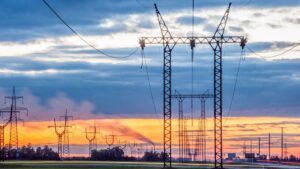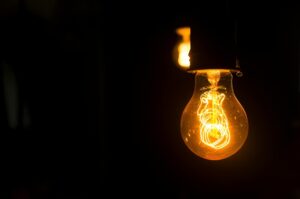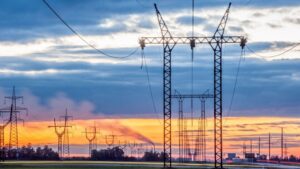
In November, amid intensified hostile attacks on the country’s energy infrastructure, DTEK Grids’ distribution system operators managed to restore electricity to almost 1 million Ukrainian families whose homes were cut off due to shelling in Odesa, Dnipro, Donetsk and Kyiv regions.
“The enemy intensified shelling of the country’s energy infrastructure in November. Lines and equipment were destroyed by missiles or drones. Most of all, in Odesa region, which suffered devastating attacks,” the company said in a press release on Monday.
Last month, power engineers managed to restore electricity to the homes of 701.7 thousand families in Odesa region.
Over the same period, DTEK Grids restored electricity to 4.8 thousand families in Kyiv region whose homes were cut off as a result of another hostile attack. In November, enemy shelling also damaged power grids and equipment in the capital, and power engineers promptly restored power to 1.1 thousand homes of de-energized families.
“In the regions close to the hostilities, the power system also suffered from enemy artillery shelling and air strikes. In the last month of autumn, the enemy continued to attack Dnipropetrovska oblast, especially the south of the region,” the press release explains.
Over the past month, power engineers in Dnipropetrovs’k region have managed to restore electricity supply to 192.1 thousand families.
In Donetsk Oblast, which remains the scene of the most intense fighting, power engineers managed to restore electricity to 75.5 thousand households in November. The company’s specialists continue to restore power grids in the frontline region every day, as soon as the security situation and the military allow.
“Since the beginning of the full-scale war, we have already restored electricity to 16.1 million families in Kyiv, Odesa, Dnipro, Donetsk and the capital,” said Alina Bondarenko, CEO of DTEK Grids.
“DTEK Grids develops the electricity distribution and grid operation business in Kyiv, Kyiv, Dnipro, Donetsk and Odesa regions. The company’s DSOs serve 5.5 million households and 158 thousand enterprises.

In November 2024, Ukraine remained a net importer of electricity, but its total imports decreased by 9% compared to October – to 165 million kWh, D.Trading LLC reported.
According to its analytical report provided to the Energoreforma portal, most of the electricity was imported to Ukraine from Slovakia (55.5 million kWh). Poland ranks second (41.4 million kWh), Hungary third (33.3 million kWh), followed by Romania (28.6 million kWh) and Moldova (6.1 million kWh).
The largest volume of electricity imports per day was on November 1 – 12 million kWh, or more than 4% of total electricity consumption in Ukraine.
According to the company, in November, as in October, imports did not reach the maximum technically permitted capacity of 1700 MW, reaching only 1300 MW in the evening peak.
“In general, the utilization of the offered cross-section fell to 42% (in October it was 72%). But at the same time, the volume of the offered crossing was 54% higher than in October – 390.7 million kWh. The interconnection with Hungary was used by 24%, with Poland – by 87%, with Romania – by 31%, with Slovakia – by 64%, with Moldova – by 27%,” the report says.
According to the company’s estimates, last month, imports, taking into account all costs, were economically feasible in only 20% of hours from Hungary (145 hours), Romania (142 hours) and Slovakia (136 hours). From Poland, imports were reasonable in 35% of all hours (254 hours).
“D.Trading notes that the main factors behind the dynamics of electricity imports during the month were deteriorating weather conditions, which led to an increase in consumption; high spot prices in neighboring EU countries caused by increased demand; shelling of energy infrastructure, which led to the renewal of restrictions; business demand for imported electricity after the restrictions were lifted.
According to the company’s analysts, in the first decade of November, imports fell from the initial level of more than 10 million kWh per day to 1-3 million kWh/day. They attribute this to a significant increase in prices on the spot markets of European countries due to the almost complete absence of renewable energy production and the growth of consumption to an excessive level.
According to D.Trading, in Hungary alone, consumption at the beginning of the month was more than 10% higher than normal for this period of time, and scheduled repairs at the Kozloduy NPP unit (Bulgaria) further worsened the situation with the balance of Southeast European countries.
At the same time, the high load on power lines due to increased consumption also led to restrictions on interstate electricity transfers.
At the same time, prices on the Ukrainian day-ahead market (DAM) were significantly lower than European prices due to price restrictions.
Analysts point out that imports continued to remain at a very low level until November 17, when massive shelling of the energy infrastructure took place.
“The restrictions imposed on industrial consumers after that increased business demand for imported electricity. Due to the extremely high prices in Europe, businesses did not use the import quota at the maximum possible level, so import growth in the last decade of November was only up to about 10 million kWh per day,” D.Trading describes the situation.
As reported, electricity imports in October decreased by 58% compared to September and became the lowest figure since March 2024.
The full report will soon be posted on the Energoreforma website https://reform.energy/.

NPC Ukrenergo and Polish system operator PSE are considering increasing electricity imports to Ukraine by an additional 150 MW, which could bring the total to 2.5 GW of electricity imports from Europe, acting CEO of Ukrenergo Oleksiy Brekht said at the 10th Kyiv International Economic Forum (KIEF) on Thursday.
”2,100 MW is the basic value that we have and can maintain. Further, we have the so-called guaranteed emergency assistance, which is another 250 MW. And today we are working with the Polish system operator on another initiative that could provide an additional 150 MW of imports,” he said.
According to Brecht, the total capacity of European imports will thus reach 2.5 GW. “In total, this is 2500 MW, almost 2.5 nuclear power units, which will help us significantly this winter,” the head of the company emphasized.
As he informed, Ukraine, together with its European partners, expects to achieve stable supply of the achieved import volumes also after the autumn-winter period of 2024-25.
“We expect that in the spring we will have a dynamic opportunity to revise the establishment of certain throughput capacities (interstate crossings of power lines) and expect that it will not be lower than the existing value,” Brecht said.
As reported, Ukraine and the EU have agreed to increase the maximum capacity of electricity imports from the EU countries from December 1, 2024, from the current 1.7 to 2.1 GW.
Ukraine will also have an additional 250 MW of guaranteed capacity for emergency flows from the EU.
In turn, starting from March 2025, European transmission system operators will be able to review the capacity limit for commercial electricity exchange between the EU, Ukraine and Moldova on a monthly basis.

NPC Ukrenergo currently sees no reason to introduce schedules for limiting electricity consumption for households, the company said on Telegram.
“The drop in air temperature at the beginning of next week will indeed predictably lead to an increase in energy consumption. But whether this will require the use of blackouts (in particular, for household consumers) can only be predicted by NPC Ukrenergo, which has not yet provided any forecasts on the application of restrictive measures,” the company said in a statement on Friday.
It is emphasized that Ukrenergo, together with the Ministry of Energy, regional military administrations and energy companies, is doing everything possible to ensure that there is no need to apply blackouts now.
As reported, Volodymyr Velychko, an independent member of Centrenergo’s supervisory board, said in a comment to Interfax-Ukraine that hourly power outage schedules could start as early as next week with a significant drop in temperature.
In response, Centrenergo called the assumption of possible power outages the personal opinion of a member of its supervisory board.
Schedules of power supply restrictions for households are introduced after other measures to balance the power system, such as internal reserves, imports, emergency assistance, and schedules of restrictions for industry, have been exhausted.

Ukraine and the EU have agreed to increase the capacity of electricity imports during the winter months to 2.1 GW, Ukraine’s Energy Ministry said Tuesday.
“Starting December 1, the maximum capacity of imports of e/e from EU countries will be increased from the current 1.7 GW to 2.1 GW. This will increase the resilience of the Ukrainian energy system in the face of criminal Russian shelling and infrastructure destruction. I am grateful to European partners, in particular to European Commissioner Kadri Simson for their consistent position and effective steps to support our energy system on the eve of winter,” Energy Minister German Galushchenko was quoted by the press service as saying.
Ukraine will also additionally have an opportunity for guaranteed 250 MW of overflow capacity from the EU in emergency assistance mode.
As the Energy Ministry recalled, the need to make an important decision for Ukraine on increasing the import capacity was discussed at a meeting between Ukrainian President Volodymyr Zelenskyy and European Commission President Ursula von der Leyen in September in Kiev.

The Swedish government has approved an additional SEK 500 million ($49 million) to support heating and electricity in Ukraine.
According to the Swedish government’s website, the new support is aimed at covering the needs of the most vulnerable people in the country. This new support will be provided in parallel with the extensive Swedish support already provided to Ukraine’s energy sector.
“Today, the government is allocating an additional SEK 500 million to support heating and electricity in Ukraine. Russia is increasingly targeting critical energy infrastructure. This new support will go to generate electricity for about 185,000 people and help support Ukrainian society, economy and business,” said Minister for International Cooperation and Foreign Trade Johan Forssell.
He emphasized that this is crucial for Ukraine’s resilience.
Minister of Energy, Business and Industry Ebba Busch noted that Sweden will continue to support Ukraine “as long as it takes”. “This SEK 500 million will be one of Sweden’s largest contributions to Ukraine’s energy supply and will help generate electricity for hospitals and thousands of Ukrainian homes,” she said.
The initiative includes two gas turbines for initial power generation. The production facility will be protected in a way that minimizes the devastating effects of Russian attacks.
The Swedish International Development Cooperation Agency will be primarily responsible for Sweden’s contribution. The project is a joint investment with the Ukrainian state energy company and other international financial institutions. The goal is for this production facility to start operating in 2025.